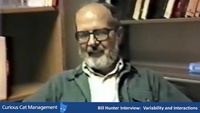Posts selected fromManagement Blog - Engineering Blog - Investing Blog and other blogs - Prediction Markets with Google Employees
Google’s prediction markets are reasonably efficient, but did exhibit four specific biases: an overpricing of favorites, short aversion, optimism, and an underpricing of extreme outcomes.
continue reading: Prediction Markets with Google Employees - Creating Jobs
- Bill Hunter and the Quality Movement
 In the presentation George Box discusses interesting student design of experiments projects; read more on those efforts in 101 Ways to Design an Experiment, or Some Ideas About Teaching Design of Experiments.
...
George's closing statement:
We carry in our hearts the inspiring memory of not only a scholar but a man that was resourceful, warm, skillful, courageous, optimistic, helpful, enterprising and generous. His career was whole and balanced in a way that is rare and as we grieve his death we also celebrate the life of a remarkable man.
continue reading: Bill Hunter and the Quality Movement - Management Improvement System Flavors
There are many useful concepts, tools and practices within what people refer to as agile software development. And the same can be said for lean. But they are distinct approaches (the links in this post flush out this idea more for those interested in learning more on that topic). That isn’t to say an organization cannot design their own solution that adopts ideas found in each approach. In fact doing so for software development makes sense in my opinion. continue reading: Management Improvement System Flavors - Stratification and Systemic Thinking
This is a great example of a positive special cause. How would you identify this? First you would have to stratify the data. It also shows that sometimes looking at the who is important (the problem is just that we far too often look at who instead of the system so at times some get the idea that it is not ok to stratify data based on who – it is just be careful because we often do that when it is not the right approach and we can get fooled by random variation into thinking there is a cause... continue reading: Stratification and Systemic Thinking - Popular Posts on the Curious Cat Management Improvement Blog in 2019
- Business 901 Podcast with Me: Deming’s Management Ideas Today
 - Are Google Management Practices Worth Studying?
Larry Dignan asks “Is Google reinventing corporate management or just living off the fruits of one big breakthrough?” Well, I believe Google offers a great deal for managers to study – see our posts on Google management practices. But that is not the same as reinventing corporate management. Most companies have no way of just replacing their management system with a “Google management system” – they don’t have the managers to make it work, or the staff or the systems or maybe even the business… However there is plenty that can be learned and adopted. continue reading: Are Google Management Practices Worth Studying? - Interview of Bill Hunter by Peter Scholtes on Statistical Variability and Interactions
 For some processes it is enough to know a couple important variables and have an understanding of how they interact to impact results. Often though problems are created because the organization doesn’t learn enough about variables that can have a substantial impact on results and therefore feels blindsided by poor results. In some of those cases they were blindsided not by unforeseeable random factors but by variables they should have learned about. And then based on that knowledge designed their processes to take into account the potential impact of variations in that variable... continue reading: Interview of Bill Hunter by Peter Scholtes on Statistical Variability and Interactions - Data is Important and You Must Confirm What the Data Actually Says
Without an appreciation for the gemba, where the data was collected, it is easy to be mislead by the data.
The most common waste of effort in examining data is reacting to the expected variation of a system as if it is something special. We have discussed this in many previous posts, for example, We Need to Understand Variation to Manage Effectively. After that, I think there is a good chance of failure to appreciate what the data is, and is not, telling us based on mistaken assumptions about what the operational definitions were... continue reading: Data is Important and You Must Confirm What the Data Actually Says - Engineering Innovation
- IT Talent Shortage, or Management Failure?
- Quality is a Journey to Excellence
 I recently uncovered this 2 day management seminar that Bill Hunter (my father) recorded in 1985 in Green Bay, Wisconsin. The embedded clip shows the first section of a the seminar.
The present system in the US has not provided for any meaningful contribution from the workers themselves to improve the methods of production and the quality of work life. They have no opportunity to exercise their judgement, imagination, creativity or versatility in ways that could contribute to their productivity and sense of dignity. It is no surprise that they undergo frustration and discouragement, feelings certainly not apt to contribute to their efficiency. The solution to our productivity problem is the necessity for management and labor to recognize the intrinsic value of the human being.
Russell Schrader continue reading: Quality is a Journey to Excellence - Continual Improvement
...the continual improvement process
- must be never ending
- must focus daily on how any process can be improved
- must focus on adopting improvement systemically (not just locally, by one person or team)
- must focus on discontinuous improvement which could include high energy kaizen events and dramatic innovation must include a study phase (PDSA) where the improvements are evaluated to determine whether they actually achieved the predicted results and
- must include improvement of the improvement process itself
continue reading: Continual Improvement - Losing Consumers’ Trust
People are emotional about their food safety. It is not just the final results that matter but the impression given. And the impression I think many see is that those involved in the food industry often place money about a mission to feed the world.
I think it is a mistake for any company to focus on only money rather than a larger purpose. But that is especially true if customers have an emotional connection to your product that requires customer to trust you care about them. continue reading: Losing Consumers’ Trust
|